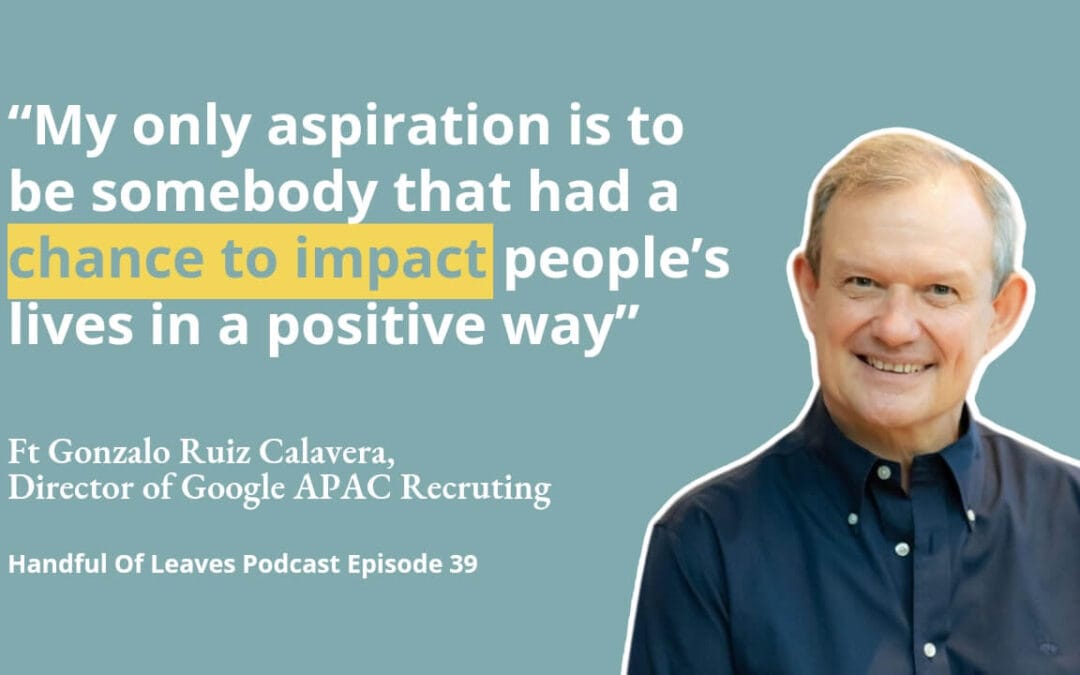

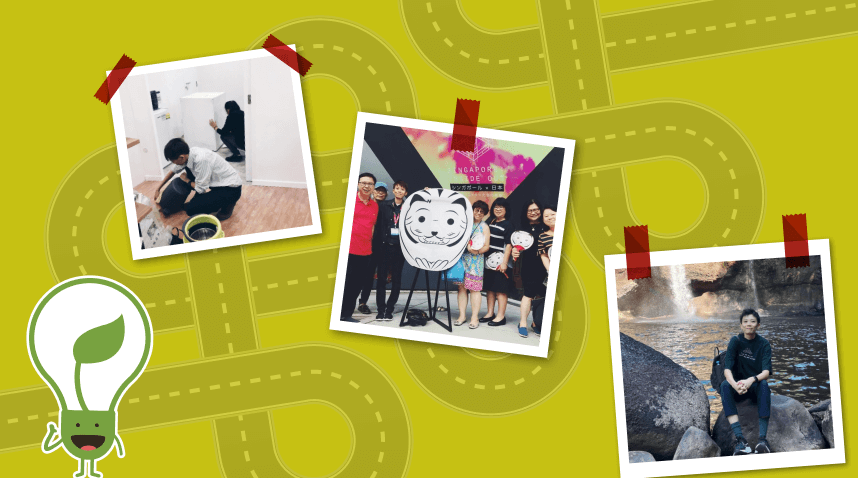
The Art of Starting and Closing a Startup: A Buddhist Journey
TLDR: Jia Yee shares on why she started her start-up and how it ended. She explores 3 Buddhist values Gratitude, Fighting Spirit, and Faith
As a writer, I often come across stories of entrepreneurs who have weathered the highs and lows of building a business. But my recent conversation with Jia Yee, a startup founder, inspired me.
Jia Yee shared her unique journey of building her startup from scratch, pouring her heart and soul into it, and eventually walking away as the business matured. What struck me the most was how she found solace and strength in Buddhism, which became a key pillar of support in overcoming the loss of walking away.
Interestingly, the birth of her startup was rooted in death.
From cancer to a start-up
“My startup was my second job in my life. I left my first job after my mom passed away from cancer and I needed that physical and mental break to just really not do anything” Jia Yee shared.
Jia Yee took a break from her first job and started a project “Strength Behind Cancer” which aimed to interview cancer survivors on their stories. She was curious to understand what her mum was going through and sought out stories to honour her mother’s memory. She continued tirelessly tracking interviewees who would share their stories.
During her search for stories, Jia Yee eventually encountered a woman who was in remission from two different forms of cancer. After their interview, the lady could tell that Jia Yee had become disheartened from her mission.
‘Jia Yee, if this is not giving you joy, you don’t have to feel obliged in doing it’ the lady said. After that, Jia Yee realised that each time she conversed with a patient, it evoked memories of her mother’s passing. The pain it brought to Jia Yee was not obvious to her. However, it was obvious to her interviewees.
That comment sparked a deep thought in Jia Yee, “Oh, my mom wouldn’t want me to be milling around. My parents have always been very open about life, they would just want me to be happy and not like, you know, super successful.”
She pondered if she was content with her life, with the conclusion being a negative one.
Inquiring what would bring her joy, she had an immediate response. This then resulted in the inception of her own business.
This is not a sexy story, but we were cleaners as well
Jia Yee found that her greatest joy was in doing projects in the arts scene and quickly found a partner to start a company. Their offering?
A full-service end-to-end creative agency. They would cover conceptualisation to execution across different mediums. Their goal was to put Singaporean design on the international map and shine a light on Singapore’s creatives.
They pitched hard to potential clients but faced a prolonged period of a dry pipeline. This brought anxiety to the founders if they had the right service offering. Then a breakthrough came.
They were cleaning the office when they found out that they had won the contract.
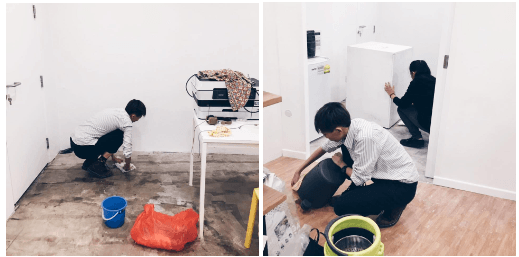
“This is not a sexy story, but we were cleaners as well.” Jia Yee chuckled. As a startup with no projects at the start, they had to do EVERYTHING themselves and cleaning was no exception.
Singapore Tourism Board (STB) awarded them a contract to profile 12 Singapore creatives in Tokyo! Jia Yee was overjoyed.
“For an organisation that’s so much bigger than us, that award gave us validation that we were doing something right!” Jia Yee beamed as she recalled.
This contract kickstarted subsequent projects by exposing their business to more people in the network. It also made future clients trust them more as they, by appearance were two twenty-somethings pitching projects in board rooms.
Their business eventually grew big enough to support creatives (who often do not have stable incomes) in the hardest of times like Covid. That was something recalled with great joy, being able to help an industry that was hit hardest during the lockdowns.
The end begins

After six years of operations, Jia Yee realised she and her business partner had different opinions concerning how the firm should be conducted and what the outlook of the company should be.
As the divergent tension developed further, Jia Yee felt that the best thing to do, when no common ground could be found, was to step down.
“There’s always a time, right time and right place. Maybe that time has concluded and perhaps it’s time for me to move on.” Jia Yee shared.
“If I hung on, cling on, what would it lead to?” She queried.
As she prepared to wind down her share of the business and planned for the exit, she felt a wave of grief. It was as if the baby she had given birth to was now to be given away.
How did she go from grief to peace? I asked. With calm eyes, she shared more.
Coping with the end
Jia Yee said that it centred around three Buddhist concepts: Gratitude, Right Effort, Faith
Gratitude
“Giving thanks. Twice.” Jia Yee smiled. Saying goodbye often entails leaving behind something or experiencing a loss. Hence, gratitude is necessary to remind us of what we have gained and learnt in our journey.
Jia Yee shared that recollecting the good times that she had while running the firm lifted up her mood. Giving thanks for the opportunity to help the arts scene during covid through grants and engaging subcontractors who were in need stood out to her.
She also embodied the essence of metta, by wishing her firm (like we would with people) to be well and happy.
By lifting up her mood and switching her narrative from loss to gain, she smoothened the edges of pain.

Fighting spirit
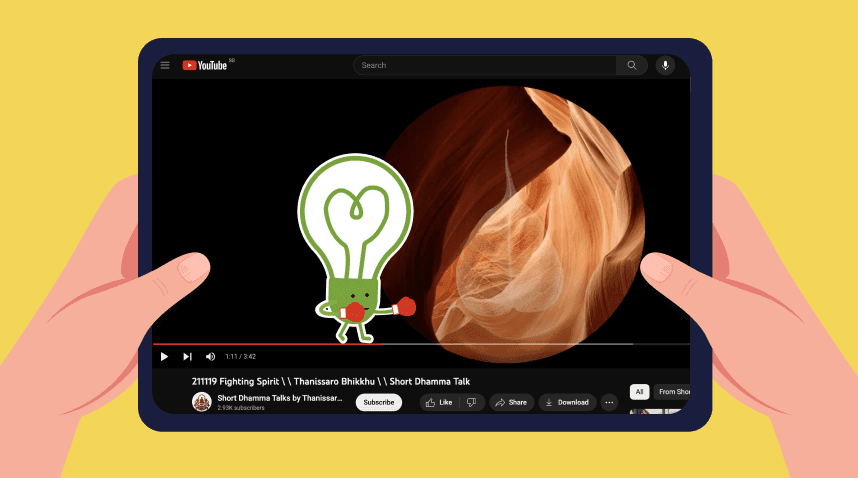
Jia Yee recalled listening to a Dhamma talk on Fighting Spirit by Thanissaro Bhikkhu, an American Theravada Monk.
“6 years wasted could put him (Siddartha) in a tailspin…. But he knew that there must be a way out of this… Raising his fighting spirit to carry on.”
Jia Yee could resonate with the struggles others faced when facing a setback. Even the Buddha had his setbacks when seeking enlightenment.
“When we stab ourselves with our bad moods, we are the ones harming ourselves.“- Thanissaro Bhikkhu.
Jia Yee mentioned that the talk encouraged her to take the leap and work on making her exit from the firm possible. In the face of difficulty, she had to bite her tongue and work through the painful admin of exit.

Faith
“Faith was carrying me throughout the entire process.” The Buddhist practice of mindfulness, peace, and wisdom stuck with Jia Yee through the process. She started to attend DAYWA, a Dhamma practice group for working professionals, on a weekly basis for guided meditation.
A facilitator asked her ‘What suffering brought her to DAYWA’ which struck Jia Yee as it was in the midst of suffering that she turned to the Dhamma.
That realisation that suffering is to be faced and understood, made her commit to showing up for the weekly sessions.
“Before attending DAYWA, I didn’t really understand the concept of peace. But after consistently meditating with the group, I think I do now” She smiled.
These 3 pillars: Gratitude, Fighting Spirit, and Faith were vital in her farewell process.
Advice to other founders
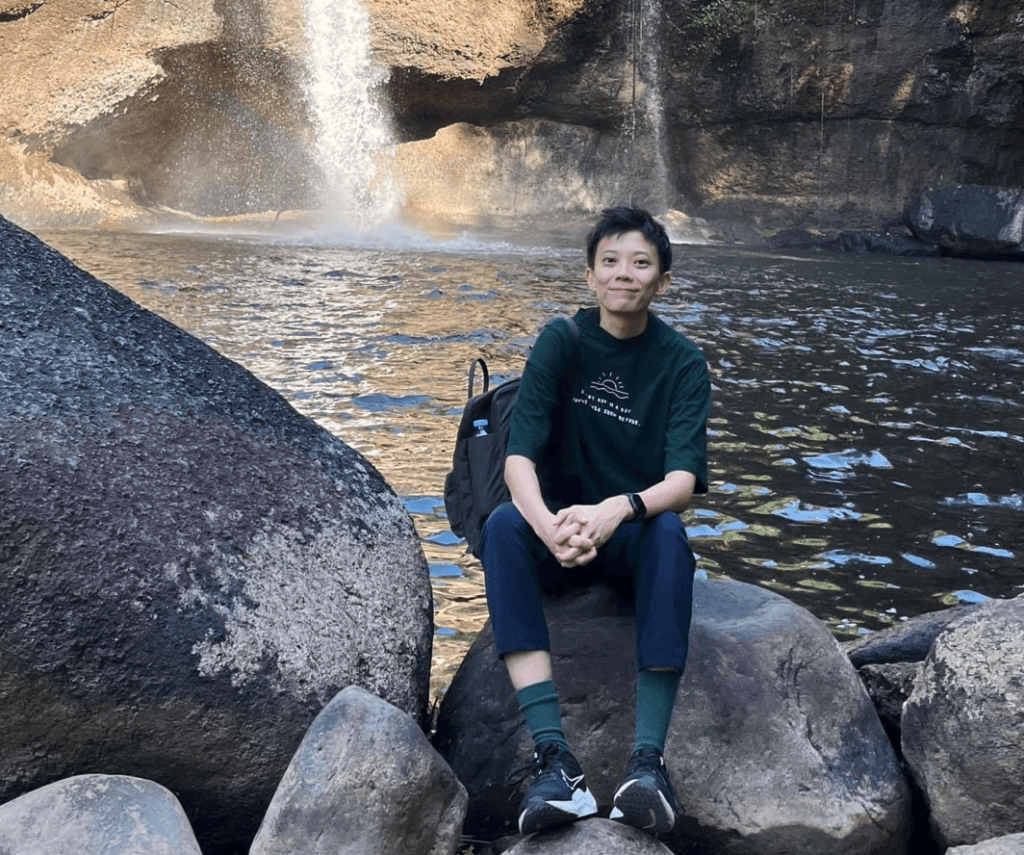
“Any advice for founders out there?” I quizzed.
She smiled and shared the following points
- Always learn from others’ experiences: Not doing so is a blessing missed
- Differentiate between good and bad stress. Good stress should not affect your self-confidence and esteem.
- Know the balance in your life: Life is not about work. Asking yourself ‘Am I balanced?’ is a key question to keep in mind
- Find your spiritual nourishment: Find something that gives your mental energy; this can come from reading or just by sitting quietly
- Find like-minded people with the same values: Find those that share your joy and experiences
Conclusion
Running a startup is not as glamorous as most magazines/newsletters might show. It takes hard work and also the wisdom to know when to say goodbye.
By relying on our fighting spirit, gratitude, and faith, founders can garner the strength to let go of what they put their life into.
That’s probably how a person can say goodbye to something very dear to them.

I brought ¼ of myself to work today: A Buddhist Perspective on Quiet Quitting
TLDR: As employees, we probably all know the practical reasons and benefits of Quiet Quitting. You don’t invest more time or effort than you are required to, and you have more time to explore other passions or priorities outside of work. In this article, we explore the impact of Quiet Quitting from other lenses, such as the Coaching lens and the Buddhist lens.
What is Quiet Quitting ?
Quiet quitting doesn’t actually refer to quitting a job—it means completing one’s minimum work requirements without going above and beyond or bringing work home after hours.
Corporations and individuals are struggling to adapt to these phenomena in this ‘post-covid’ world. The idea of Work and our attitudes towards it have shifted, prompting many individuals also to adopt their own coping mechanisms such as ‘Quiet Quitting’.
Cost of Quiet Quitting
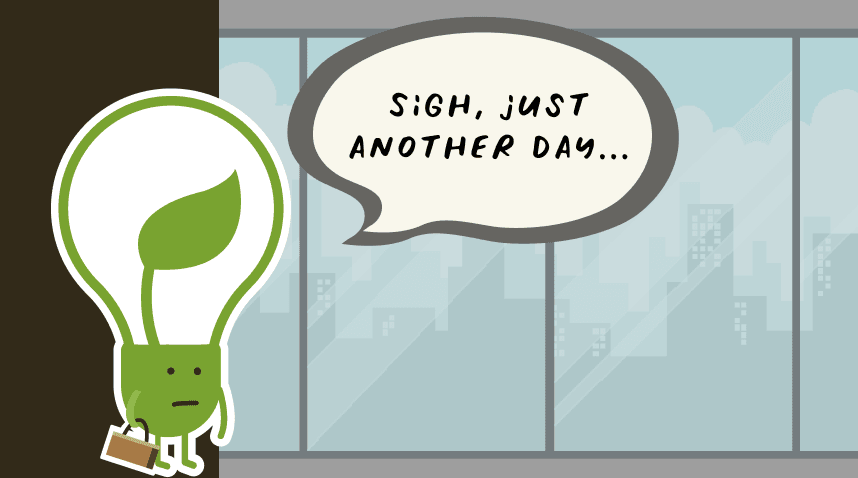
From my personal experience as a career and leadership Coach, I have heard all sorts of reasons why people ‘Quiet Quit’. Some employees cite burnout as a key reason, and others think that ‘going above and beyond’ is simply not worth it.
One of my coachees has put in many late nights and volunteered to lead extra projects at work, for the sake of pushing for a promotion.
After a year of doing all these, the management decided to restructure, and it meant her promotion just wasn’t on the table anymore.
My first question to my client is ‘Why don’t you just quit for real?’. It is important to understand what’s holding us back from throwing the letter and to grasp what is the cost of staying but not being fully engaged in the current job.
There are of course many different circumstances of ‘Quiet Quitting’, where individuals argue they are still fulfilling the minimum expectations of the job. There are some employees who still fulfil basic tasks mindlessly, often not putting in much effort nor being very efficient.
They tend to say things like “since I can’t change the stupid processes, I will just follow lor.”
There are other employees whose work does not resonate with their personal values and purpose. Hence they often cannot find meaning or fulfillment in their work, and tend to look outside of their day job for it.
Also, some individuals are already plateauing in their role, therefore not finding their work challenging anymore.
Without a sense of challenge, it is hard to feel any sense of professional growth or achievement. They might just ‘cruise along and maintain status quo’.
The cost of Quiet Quitting is also detrimental to the employer, who struggles to get a productive workforce, and the team, who has to deal with a mentally checked-out individual.
It might affect the team dynamics negatively, where other team members have to pick up the slack. When the employee has lost motivation, there might also be a ripple effect on the overall energy of the team.
In extreme cases, the Quiet Quitter is resentful, perhaps due to perceived unfairness or stuckness, and can demonstrate strong negative emotions at work.
But what about the Quiet Quitter? What are the unseen costs to the individual?
The unseen costs of quiet quitting.

While Quiet Quitting might seem to be a plus for the employee who can slack off and get to what interests them, as a career coach, I am aware of the detrimental side effects to both the individual and his/her/their relationships.
When we spend 8 hours of our time every day on something that does not resonate with us, it is hard to find joy and fulfilment. Even if we tell ourselves it is just for a paycheck, it is hard not to feel stuck.
“What is the cost of doing this, to yourself?” I might ask the Quiet Quitter. “If you had only 1 month to live, would you be doing this?”.
Sometimes I would ask my coachees, ‘How do YOU feel going to work every day?’ I have not had a single client who said he/she was truly ‘Happy’ or even ‘At peace’.
As most of us reading this probably still hold onto a sense of ‘Self’ [1] to some degree, this unhappiness stems from not being resonant with your true ‘Self’ at work. It is hard to feel satisfaction at work when you are not being your true/best ‘Self’.
When we think about this from a Buddhist perspective, are we really being kind [2] to ourselves, and colleagues around us? Is there still ‘Suffering’ [3] , even if we have mentally checked out?
So with a boundless heart
Should one cherish all living beings;
Radiating kindness over the entire world:
Spreading upwards to the skies,
And downwards to the depths;
Outwards and unbounded,
Freed from hatred and ill-will.
Whether standing or walking, seated or lying down
Free from drowsiness,
One should sustain this recollection.
This is said to be the sublime abiding.
By not holding to fixed views,
The pure-hearted one, having clarity of vision…
The Buddha’s Words on Loving-Kindness [4]
If we are being kind to ourselves, our colleagues, our family and our friends, what do we want for ourselves and others? As Buddhists, do we not want to radiate kindness, love, and freedom to all beings around us?
My coachees often say they want clarity in life. Sometimes clarity appears when we explore metaphors and visualizations.
“When you say you want to feel free of ill-will, what image comes to mind?” One of my coachees, Mr S from California said to me last week, “If only I could pick up my surfboard again and feel the sun on my back, fearlessly riding the waves in the ocean.”
Another coachee in Switzerland told me, “I want to put down my very heavy backpack. I have been carrying my husband and three kids in it for the last six months, climbing up the Swiss Alps. I just wish to put it down by the lake and the kids can come out and play happily.”
We might not be a hundred percent clear of what exactly we want, but we know exactly what we don’t want. Try asking ourselves, “How do we want to Feel?” instead.
We might want to feel the warmth of the sun, the carefreeness of surfing, the achievement of riding the big waves, the lightness of not carrying everyone or the joy of having fun together.
What’s next?
The purpose of this article is not to judge whether ‘Quiet Quitting’ is right or wrong, nor to tell you what to do next. It is simply to bring awareness to your situation and what you are feeling.
Some questions to help your contemplation if you noticed you are Quiet Quitting:
- On a scale of 1 to 10 how engaged are you at work? (1 being your soul has left the building, 10 being super engaged and flourishing)
- What’s stopping you from being fully engaged?
- How much is this job aligned to your Values?
- What are the benefits you can get from this job? (monetary and non-monetary such as knowledge, experience, network etc)
- How could you reframe your perspective or reshape your role?
- What is the cost of staying in your current job? (any negative emotions, physical tension/pain etc)
- If money is not a consideration, what options are possible for you next?
As we contemplate, do bear in mind that our jobs are impermanent, our emotions are impermanent, and the economic crisis is impermanent. And we probably will be talking about another new trend a couple of months from now. 🙂
References:
- Anatta-lakkhana Sutta: The Discourse on the Not-self Characteristic
- Karaniya Metta Sutta: The Buddha’s Words on Loving-Kindness
- Saṁyutta Nikāya: Connected Discourses on the Truths
- The Noble Eightfold Path: The Way to the End of Suffering by Bhikkhu Bodhi

Celebrating Independence – the Buddhist Way
TLDR: What does independence in Buddhism look like? Zeb shares how awareness, compassion, and acceptance help him to experience some liberation from suffering in daily life. He also discovers what the Buddha’s half-smile represents to him.
Quick quiz, it is the month of August, what comes to mind? Fireworks may come to your mind since it’s the month of the celebration of Independence in 3 countries in Southeast Asia. The 3 countries are: 1) Singapore Independence Day, which is observed on the 9th of August; 2) Indonesia Independence Day on the 17th of August; and 3) Malaysia Independence Day on the 31st of August, respectively.
For me, independence refers to experiencing the fruits of the Dhamma, liberation from the suffering of daily life. Gaining ‘independence’ from the grasp of suffering.
This August, I wish to share my experience with you on how awareness, compassion, and acceptance can help you realise ‘independence’. When we can free ourselves, we are freer to free others of their suffering in turn. As a bonus, I would like to share what the Buddha’s half smile represents to me.
Awareness helps us stay on course:
If we are not aware of what is on the ground that may trip us over, we may suffer serious injury. Looking at suffering when we are suffering can make the pain seem endless. But if we look deeper, we may note that there are two levels of pain.
The Buddha uses the parable of the 2 arrows, with the first arrow being the actual pain, while the second arrow is our reaction to the initial pain. Knowing the difference between them brings to mind that “pain is inevitable, but suffering is optional.”
We suffer because we are afflicted by the three poisons in Buddhism – greed, hatred, and delusion. We suffer because we are greedy and desire more. We want that extra serving of ice cream when we are already full leading to unwanted stomachaches.
We suffer because we are angry that we missed out on the popular Taylor Swift concert tickets purchase, while our enemies got lucky. We suffer because we are lost in our own delusional thinking that we should not have to suffer in life.
We ignore the 1st Noble Truth, that “There is Suffering.”
When we are aware and realise how we are afflicted by the three poisons, we may have a chance at suffering less.
We are less caught up with the pattern of clinging, pushing away, or being lost in our faulty thinking that life is unfair just because we suffer in our daily life.
I lost my job as a Counsellor in June 2023. I practised letting go of my desired identity as a healer. I accepted the emotional turmoil that I experienced as I faced the loss of my coveted career. I saw the pain of losing my job and discerned to not burden myself with additional suffering, by playing the blame game.
Karunā (compassion) when suffering overwhelms
Pain is pain, we do have to honour the power of pain in its ability to overwhelm our senses. In meditation retreat practice, we are encouraged to watch pain in earnest mindfulness, because pain is also subject to the law of impermanence. Yet the truth remains that some pain may take a little longer to go away than we can handle.
A strategy I found to be helpful in cases where the pain was overwhelming was to apply compassion to myself.
The traditional phrases that we can use to apply compassion go like this: “May I be free from pain and suffering.”
Just reciting the compassionate phrase repeatedly, can have a calming and relaxing effect on us, and I observed that my pain slowly reduces in its intensity, because I was not so tense and uptight about the pain anymore.
I know it works for physical pain because I have not once, but two different hospitalization experiences in the past 4 years, with a combined hospital stay of 26 days in total!
I became an unwilling participant in observing human pains, both of myself and others, in a hospital setting. I am also grateful to have excellent medical care at Singapore’s Hospitals.
Using my medical pain – being hospitalized, was a valuable lesson in understanding suffering. I observed that I can choose to suffer less because I was able to apply mindfulness and compassion in facing my pain with much patience.
There are limits to what painkillers can do to mitigate the pain. I tried to observe the pain mindfully, but my mind was just too confused and distressed under the cocktail combinations of physical pain, painkillers to manage the pain, and the mental pain of being alone in a hospital ward.
I tweaked the compassion phrases to “May I be free from pain and suffering, as much as possible,” given that the strongest painkiller was only capable of dulling the pain so much, and I cannot realistically expect the pain to disappear.
Surprisingly, or unsurprisingly, when I notice that I am more relaxed and accepting of the pain, the suffering naturally reduces in its intensity.
Acceptance of our reality:
The 1st Noble Truth states that “There is Suffering.” No need to run away from suffering. We are not choosing to embrace unnecessary suffering, but we learn not to run away from inevitable suffering.
We are learning not to add the 2nd arrow of suffering, on top of the 1st arrow of pain.
When suffering arises, we can watch it mindfully, and observe the ever-changing nature of the physical, emotional, and mental nature of the suffering.
Acceptance is not about being a defeatist, it is instead a courageous act, to accept reality for what it is. It is having the inner confidence that one can tackle whatever things life throws at us. Of course, we are armoured with the Wisdom of the Buddha’s teaching, to have various practices such as Mindfulness, 4 Brahmavihārā, and Forgiveness, to help us face and overcome the challenges in life.
With mindfulness, I pay attention to my ever-changing thoughts and emotions about the loss of my job. Sending loving kindness to myself, I try to maintain a positive mindset with the inevitable change.
Practising compassion, I strengthen my empathy for myself and others who are affected by layoffs and retrenchment.
I remain joyful for those who have a job now, for they are not suffering from the uncertainty of job loss.
And I try to stay equanimous, knowing that change is inevitable in life and that I will be employed in due time, with the right effort placed in my job search process.
Finally, I try to forgive myself for being less office politics savvy which may have led to my job loss; and I resolve to continue to learn and get mentoring to up my game in the workplace.
Hence, I suffer less, by having the wise understanding that there is suffering in life and recognising that it is not a personal failing to face suffering, or that I am being punished by some invisible beings out there.
I also want to thank and express my anumodana (gratitude) towards my kalyāṇamitta (spiritual friends) who have inspired me to continue learning and practising the Dhamma.
My spiritual friends reminded me of the impermanence of life’s ups and downs, and that I would suffer if I were stuck in holding on to my perceived identity loss of a Counsellor when I lost my job; but by turning to the Dhamma, I can find some solace and further deepen my understanding of the suffering and impermanence of one life’s status.
The half smile:
As I journey through life and the inevitable challenges in life, by practising the Dhamma, I come to understand the Buddha’s half smile, as realising, and accepting the suchness of life that there is nothing that I need to push away or to cling to and that is okay.
When I am secure in my acceptance of the Buddha, Dhamma, and Sangha in my life, I too smile contentedly like the Buddha, that I will have both wisdom and compassion to meet life challenges resolutely, with calm and ease.
The ultimate independence:
In conclusion, I hope the above personal sharing inspires you to continue to practice the Dhamma to attain the ultimate independence, which is Nibbana (Enlightenment). If we practice the Dhamma, we can find moments of mini-independence and freedom, that will help buffer against our day-to-day living stressors.
Whatever small amount of ease and lightness in our life that we can glean and experience, it will surely continue to build upon our faith and practice in the Dhamma.
I wish you too will have a taste of experiencing liberation and smile like the Buddha’s half smile. Sukhi hontu – May you be well and happy.
Wise Steps:
- Explore how you can practice Mindfulness and Compassion in recognising and enduring the minor inconveniences in life.
- See if you can adopt the Buddha’s half smile in accepting the inevitable challenges in life.
- If you are in a position to support your friends who are in career transition, extend your help. You may refer to this past HOL article by Livia Lee for additional ideas to support those who faced layoffs.

5 Work-Life Wisdom Tips: A Letter to My Graduate Self
Editor’s note: It is commencement month! For fresh graduates, you’ve crossed yet another milestone with blood, sweat, tears, and joy. Sze Yuan shares his advice.
TLDR: Entering his 5th year of work in the Public Service, Sze Yuan imagines the advice he would give to his younger self as he starts work.
Dear Sze Yuan of 2018,
Good job on completing 4 arduous years of university! As you look back, memories of the winter exchange in Norway, the fun orientation times at Sentosa, the long nights studying in the library, and the silly times spent with friends linger dearly in your heart.
There is longing in your heart for the youthful days gone by – and you are stepping ahead into adulthood with trepidation.
You have done well in your university studies, yet applying the theories in practice seems frightening. You have served actively in the Buddhist scene, but are uncertain if your spiritual ideals are compatible with the “real” adult world.
I want to reassure you that it is ok to feel what you are feeling!
There will be bumps, and periods of darkness too. When things get too unbearable, or when your light needs some refuelling, I hope that the words below offer some encouragement to you.
| A day before I start work, there is a rush to get things done to get my 7 hours of rest so that I can do my morning sit and get to work tomorrow. But I think it is worthwhile to spend some time recording my state-of-being now… There is a small part of fear and anxiety… On the other hand, also excited about a new phase of life, about doing new things. Excited to be able to contribute back to society, and through my salary, to support my loved ones. Excited to face the often-talked-about “real world”, and to see how my practice helps to handle these situations. 01-07-2018 |
1) Relationships Matter

I know that you don’t feel confident socialising, and enjoy your own company more. But I encourage you to step out and to open your heart to others.
Cherish the friends you made through internship, university, orientation programmes. Above all, keep your spiritual friends (kalyanamittas) close.
You will soon find that it is very hard to move things purely through formal channels at work. The nicest emails and requests move along only with the lubricant of warm ties.
Likewise, be ready to lend a hand when others seek your help too. It is not just that this will encourage others to help you next time (which is of course nice)! But you will find that these small acts of giving leave the deepest impression on you.
They will make you feel good about yourself.
In a few years’ time, your work (and world) will drastically change. I won’t spoil it for you – but just know that you will be working from home often.
As much as you dislike small talk in pantries and discussions in big meetings, you will soon realise how important these physical interactions are for your mental well-being. It is a “love-hate” relationship with colleagues after all – inconvenient with; depressing without.
You will see that you are not an island, and still require the familiarity of human touch and care to warm your soul.
Hence, learn to open your heart to others, and to allow the light outside to enter you too. Things are brighter this way.
| The system is imperfect. There’s more work to do than any one of us can manage. It is like fitting lego blocks in a space less than they can fit. To fit, one has to be cut and squeezed, so in this system that we work in, we will always have to work out compromises between colleagues. It is not easy and takes a lot of soft skills, and sometimes you offend people… It is an imperfect system – it is the human big-heartedness, forgiveness, and patience that lubricate things. 30-10-2019 |
2) Things Connect
Things will seem quite hopeless in your first few years at work. You will wonder why you signed up for this, strain against the bonds that the scholarship placed on you, and wonder if anyone is doing any “real” work in this system at all.
I want to reassure you that this is normal. You are right – the system is far from perfect. There are many red tapes, bosses may not be understanding, and work can be utterly boring.
However, keep faith that things (sometimes) connect upwards. Some of the seemingly insignificant tasks will turn out to be the catalyst for larger opportunities at work and for spiritual growth.
You will also realise that the many small tasks you do amalgamate into a larger theme – the details fade, but the spirit in which you carry out the work lingers.
If you learn to do each small thing well, you will feel good about yourself when the larger project is completed.
Remind yourself that how you do things matter as much, if not more, than what you do.
Of course, there are things that just don’t make sense. Sometimes, you have to call a “spade” a “spade”. During these times, keeping a sense of humour can be immensely helpful!
3) “Work-Life Balance”
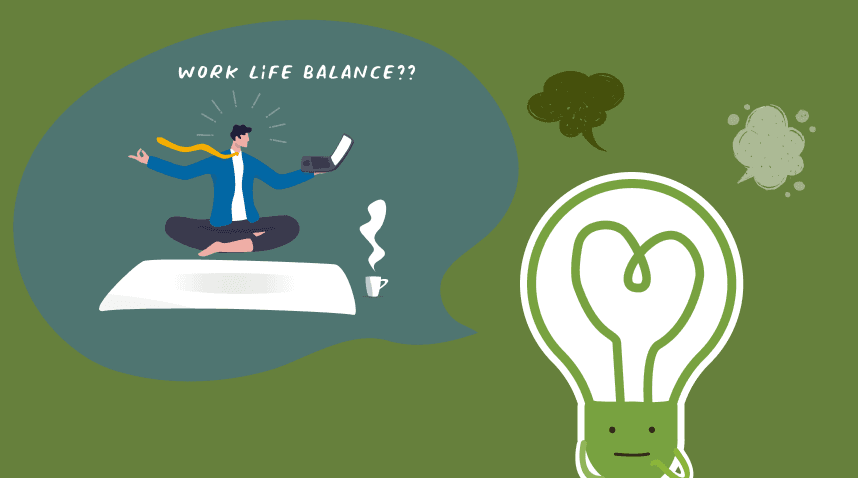
You will spend much time finding this elusive “work-life balance”. I am sorry to burst your bubble – 5 years in, I am still searching too.
But I am learning things about my(your)self through this search, which is very helpful. Here are some tips:
- Start and end each day with meditation.
- Focus on one task at a time as far as possible.
- View your colleagues as buddies on a group quest – not enemies.
- Use toilet breaks to exercise your legs and slot in some simple body stretches (pro tip: use the further toilet for more exercise!).
- Have a system to keep track of your work tasks. Gamify your work, and take pride and find joy in tackling each task.
- You will end many days feeling unproductive and lousy about yourself. Learn to be kind to yourself (note: 5 years in, I am still working on this too).
- A period of exercise after work (even a short 10-minute run) can help calm the restless mind.
- End the day by recollecting your wholesome deeds and things to be grateful for. Don’t assume you will wake up the next day.
- There will be unavoidable times when you work till late at night or over weekends. Develop a bigger heart and view them as par for the course.
- Devote yourself to causes outside of your work – continue serving and developing affinities within the Buddhist community.
To be honest, I’m starting to think that a balance may never be found. Perhaps it is a moving balance? Or should it be work-life “harmony”?
Perhaps work and life should not be distinct entities, and should merge into the present moment? Or maybe we won’t be balanced until Enlightenment?
I will let you know when I find out.
| With work, it hasn’t been easy to find motivation, so during these times when I can pop my head out from this whole dreariness, I just thought of recording it down so that this reinforces the wholesome perspective. With time, in years, maybe decades, hopefully I can gain sufficient wisdom to handle my work and mundane responsibilities in the world with grace and elegance. Far from it now, but I am making the effort. 10-10-2020 |
4) Cultivate Skillful Perspectives

Being in public service, you are cruising along in a large ship. Things are stable, and you can be quite assured that we are heading towards a decent destination.
However, you will soon realise that on this ship, not everyone gets fancy uniforms and jobs. You will get your chance – but most times, you are doing the ignoble tasks like scrubbing the deck floor, rowing the giant paddle, cleaning out the toilet, or singing/dancing for the entertainment of others (this last part, I don’t even mean it metaphorically. You will do it).
You will witness many colleagues jumping ship (pun intended), and you may even feel a tinge of envy towards them for doing what you can’t.
In these times, I want to encourage you to maintain perspective and remind yourself that the summation of these “ignoble” tasks leads to the ship’s overall success.
You may think that this is deceiving yourself. But, remember that of all the stories you narrate at work, the most important story is the one you tell yourself.
To share a story that inspired me (you):
| A gentleman walked past a building site to see three men laying bricks. He approached the first and asked, ‘What are you doing?’ Annoyed, the first man answered, ‘What does it look like I’m doing? I’m laying bricks!’ He walked over to the second bricklayer and asked the same question. The second man responded, ‘Oh, I’m making a living.’ He asked the third bricklayer the same question, ‘What are you doing?’ The third man looked up, smiled, and said, ‘I’m building a cathedral.’ Source here |
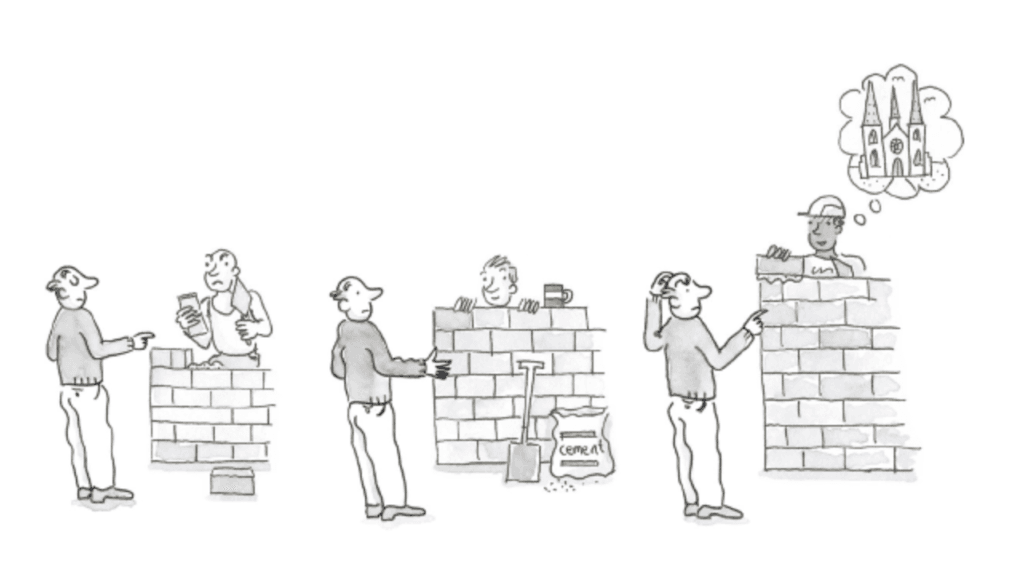
So Sze Yuan – choose to build a cathedral.
5) The Spiritual Path
Finally, the fortunate, and sometimes painful thing, is that you will remain deeply devoted to your spiritual path.
Fortunate – because even in the toughest times, your spiritual compass will give you a reason to keep faith and carry on. It will strengthen you to be kind when provoked, patient when frustrated, compassionate in the face of suffering, and joyful in the midst of others’ success.
It will give you meaning, even when the conventional world/circumstances tempt you into thinking otherwise.
But the path is also painful. There will be times when you are confused by the strivings of this world, and be averse to the consumption habits that society normalises. You will think that many endeavours at work contradict your deepest values, and feel confused about the way forward.
During your lowest, you will feel utter meaninglessness in life, and things will get really dark.
These times, keep the faith and continue walking towards the light. Learn to see the wholesomeness in things, instead of picking on the faults.
Cultivate the habit to see the “half-full” instead of the “half-empty”. Above all, learn to embrace all things as part of your path in life, and to open the doors of your heart to all teachings at work (and in life).

After all that has been said, you still will not be prepared for what is to come. And this is alright as well, Sze Yuan. Some things we learn through peace; others through storm.
As the saying goes – 世上无难事,只怕有心人 (There are no difficulties in life that are insurmountable to the sincere and committed).
So buckle up, and enjoy the ride!
Best wishes,
Sze Yuan from 2023
Wise Steps:
- When in doubt, be kind
- Do your best in everything
- Seek balance – but do not get attached to it
- Cultivate perspectives that feed your joy
- Make everything your path, and follow your path with heart
